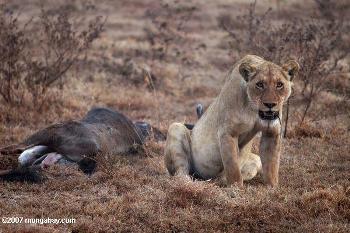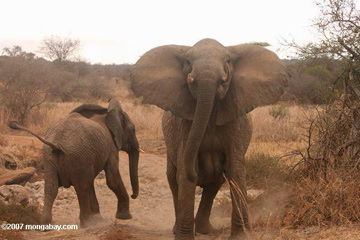UPDATE: Tanzania has announced it will be going ahead with a gravel road through the Serengeti. For more information: Unpaved road through Serengeti to progress and Richard Leakey: ‘selfish’ critics choose wrong fight in Serengeti road.
In what is a victory for environmentalists, scientists, tourism, and the largest land migration on Earth, the Tanzanian government has cancelled a commercial road that would have cut through the northern portion of the Serengeti National Park. According to scientists the road would have severed the migration route of 1.5 million wildebeest and a half million other antelope and zebra, in turn impacting the entire ecosystem of the Serengeti plains.
“The State Party confirms that the proposed road will not dissect the Serengeti National Park and therefore will not affect the migration and conservation values of the Property,” reads a statement from the Tanzanian Ministry of Natural Resources and Tourism. A paved road, however, will be constructed close to the park boundaries: ending at Mugumu on the western side (12 kilometers from the park’s border) and Loliondo on the eastern side (57.6 kilometers from the border), allowing a slim buffer of habitat around the park. It is uncertain whether a gravel road will be constructed through the park, but if it is it will remain under the park authority TANAPA and will be used for tourists and administration says the statement.
According to a recent scientific study, direct impacts from the road would have cut the wildebeest herd down by over one-third (over half a million animals) with indirect impacts, such as poaching, fences, and new development, exacerbating the situation.
“[The road’s cancellation] is a wise and insightful decision by the Tanzanian Government,” Andrew Dobson, who was one of the authors on the study, told mongabay.com. “It will ensure the long-term persistence of the Serengeti ecosystem and its world famous wildebeest migration, while also providing infrastructure to the people who live to the East of the Serengeti. It allows Tanzania to show great leadership to other African nations, by illustrating that the way to economic success in the 21st Century is to balance natural resource conservation with economic development.”
 Female lion guards a wildebeest kill in Tanzania. A leaked government study warned that the now-cancelled road project would have hurt the Serengeti’s big predator species. Photo by: Rhett A. Butler. |
A leaked government environmental impact study largely agreed with Dobson’s study, finding that the road would ‘limit’ the Serengeti migration and hurt predator populations (lions, hyenas, cheetahs, leopards, crocodiles, etc.) due to a declining prey base.
By 2015, the government report predicted that 800 vehicles per day would cross the proposed 30 mile (50 kilometer) stretch of the park. By 2035, the number of vehicles per day is expected to rise to 3,000, or well over a million a year. Conservationists and researchers in the area told mongabay.com that these were conservative figures.
For over a year conservationists warned that the road would eventually kill the iconic migration, crippling Tanzania’s tourism industry and ending one of the last great wildlife spectacles on the planet. Wildlife NGOs fought fiercely against the road, including crafting images of wildebeest being mowed down by semi-trucks.
But concern regarding the road came from more than just environmentalists. The US and German governments, as well as the UN, voiced opposition to the road plans. The World Bank offered to pay for an alternative route circumventing the park, while the German government offered to pay for local roads for cut-off people in the northern Serengeti region. Connecting far-flung local populations was the Tanzanian government’s line on the need for the road, however many suspected that the road was being aggressively pushed as part of an industrial corridor to bring raw materials from the African interior quickly and cheaply to the coast. In the statement on the road cancellation, Tanzania says it is considering the alternative southern route.
 African savanna elephants in the Serengeti. Photo by: Rhett A. Butler. |
“A battle has been won, but the struggle to save the Serengeti goes on. Roads will still be constructed up to the edges of the park. The pressures on the Serengeti, including a commercial corridor to Uganda, still exist. The highway across the Serengeti has been proposed three times now, and can be raised again. But yes, let’s congratulate ourselves on the work we’ve done,” reads a statement from the NGO Serengeti Watch.
Environmentalists have been increasingly concerned by government plans in Tanzania. While the Serengeti road has received the most coverage, Tanzania has also recently announced plans to mine soda ash in the world’s most important lesser flamingo breeding ground, Lake Natron. The plans were abandoned in 2008 due to concerns that it would disrupt the flamingo’s breeding, but were recently resurrected and put on the fast-track. Over half of the world’s lesser flamingos (65-75%) breed on the single lake.
However, Dr. Dobson says now is the time to credit the Tanzanian government for safe-guarding the Serengeti ecosystem.
“President Kikwete and Minister for Natural Resources and Tourism, Ezekial Maige, deserve the nation’s and the world’s praise for making a wise and forward looking decision at a time when they were under pressure from multiple national and international sources to make a very difficult decision,” Dobson said. “They have shown great leadership that points the way to the future for all African nations.”
Related articles
Conservation issues in Tanzania

(06/09/2011) What’s happening in Tanzania? This is a question making the rounds in East African conservation circles. Why is a nation that has so much invested in wild lands and wild animals pursuing projects that researchers say will not only gravely harm some of the nation’s world-famous wildlife and ecosystems, but also undercut its economically-important tourism industry?
Serengeti road project opposed by ‘powerful’ tour company lobby
(03/16/2011) Government plans to build a road through Serengeti National Park came up against more opposition this week as the Tanzanian Association of Tour Operators (Tato) came out against the project, reports The Citizen. Tato, described as powerful local lobby group by the Tanzanian media, stated that the road would hurt tourism and urged the government to select a proposed alternative route that would by-pass the park. Tato’s opposition may signal a shift to more local criticism of the road as opposition against the project has come mostly from international environmentalists, scientists, and governments.
Leaked government study: road will damage Serengeti wildlife, despite president’s assurances
(02/10/2011) Tanzania’s President, Jakaya Kikwete, today gave promises that his proposed road project, which will bisect the Serengeti plains, would not hurt one of the world’s most famed parks and one of its last great land migrations. “The Serengeti is a jewel of our nation as well as for the international community. […] We will do nothing to hurt the Serengeti and we would like the international community to know this,” Kikwete said in a statement reported by the AFP. However, a government environment impact study, leaked to the conservation organization Serengeti Watch, paints a very different picture of how the road will damage the Serengeti. The report includes warnings that the road will ‘limit’ the migration of the plains’ 1.5 million wildebeest and 500,000 other herbivores including zebra.
Scientists: road through Serengeti would likely end wildebeest migration
(02/02/2011) A new study finds that a proposed road cutting through Serengeti National Park would likely have devastating consequences for one of the world’s last great migrations. According to the study the road itself could lead to a 35% loss in the famed park’s migrating wildebeest herd, essentially cutting the herd down by over half a million animals. Despite such concerns, and the availability of an alternative route that would bypass the Serengeti plains altogether, the Tanzanian government has stated it is going ahead with the controversial road.
World Bank offers to save Serengeti from bisecting road
(01/31/2011) The World Bank has offered to help fund an alternative route for a planned road project that would otherwise cut through Tanzania’s world famous Serengeti National Park, according to the German-based NGO Nature and Biodiversity Conservation Union (NABU). When announced last year, the road project raised protests from environmentalists, scientists, and Tanzanian tour companies, but the Tanzanian government refused to shift plans to an alternative southern route for the road, thereby bypassing the park.
Threatened on all sides: how to save the Serengeti

(09/27/2010) Tanzania’s plan to build a road through the Serengeti has raised the hackles of environmentalists, conservationists, tourists, and wildlife-lovers worldwide, yet the proposed road is only the most recent in a wide variety of threats to the Serengeti ecosystem. A new study in mongabay.com’s open-access journal Tropical Conservation Science looks at the wide variety of issues facing the Serengeti and how to save one of the world’s most beloved landscapes and wildlife communities.
Road through the Serengeti will eventually ‘kill the migration’

(07/08/2010) Tourists, conservationists, individuals, and tour companies have launched an international outcry against the Tanzanian authorities in response to the announcement of the planned construction of the trans-Serengeti Highway highway. There is even a Facebook group and an online petition with 5,038 signatures. But the government has responded by saying that the plans are still on course.







